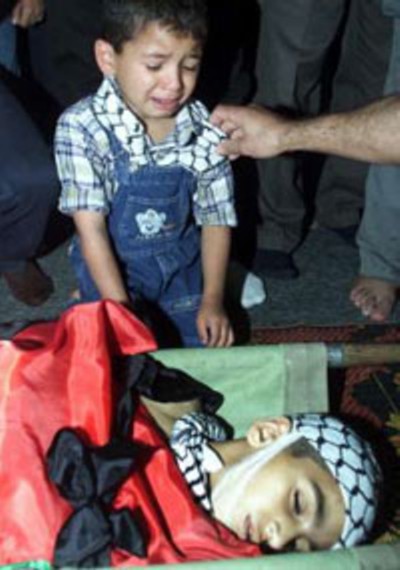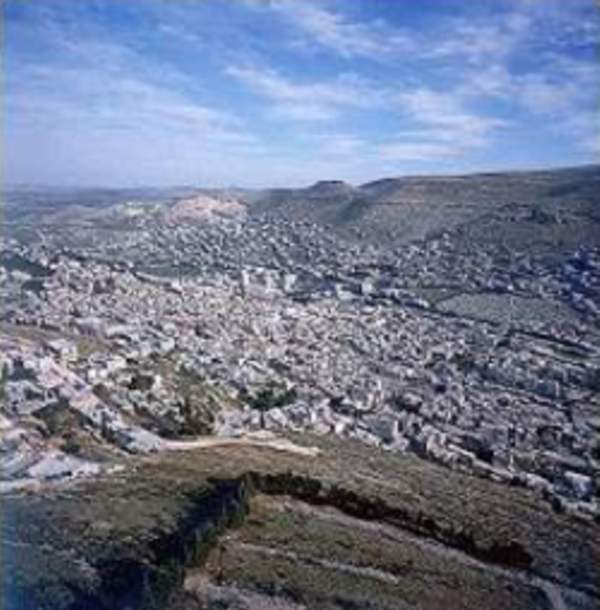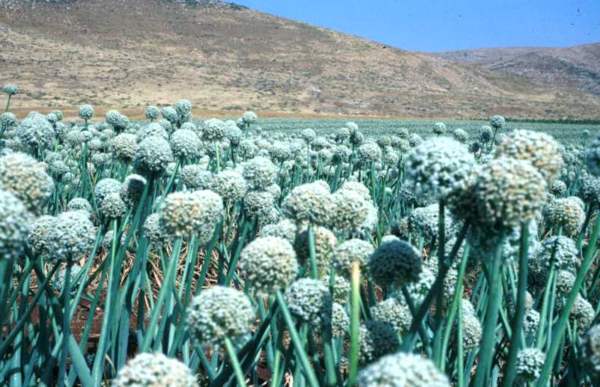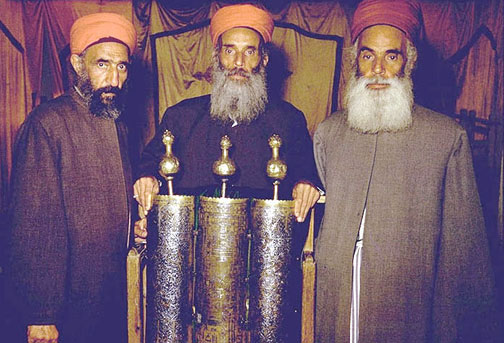
FEBRUARY 2004

Only the Knafeh is still sweet
Sun., January 25, 2004 Shvat 2, 5764 Israel = Time: 02:00 (GMT+2)
By Gideon Levy
NABLUS, West Bank - The knafeh here is still the best in the world, living up to its reputation. In the early evening, Abu Salha's pastry shop, by the side of the road that climbs to the Refidiya neighborhood, is deserted, the shelves almost empty. A salesperson wearing transparent gloves slices the traditional sweet oriental hot cheese delicacy, the taste of which is the only thing that remains unchanged in this beaten and battered city.
From one visit to the next, one sees Nablus declining relentlessly into its death throes. This is not a village that's dying behind the concrete obstacles and earth ramparts that cut it off from the world; this is a city with an ancient history, which until just recently was a vibrant, bustling metropolis that boasted an intense commercial life, a large major university, hospitals, a captivating urban landscape and age-old objects of beauty.
An hour's drive from Tel Aviv, a great Palestinian city is dying, and another of the occupation's goals is being realized. It's not only that the splendid ancient homes have been laid waste, not only that such a large number of the city's residents, many of them innocent, have been killed; the entire society is flickering and will soon be extinguished. A similar fate has visited Jenin, Qalqilyah, Tul Karm and Bethlehem, but in Nablus the impact of the death throes is more powerful because of the city's importance as a district capital and because of its beauty.
A cloud of dust and sand envelops the city, which gives the impression of being a combat zone during a cease-fire; its roads are scarred, its electricity poles and telephone booths are shattered, government buildings have been reduced to heaps of rubble.
But the true wound lies far deeper than the physical destruction: an economic, cultural and social fabric that is disintegrating and a generation that has known only a life of emptiness and despair. More than any other place in the territories, a state of anarchy is palpably close here. There is no city as blocked and sealed as Nablus. For the past three and a half years it has been impossible to maintain even a semblance of ordinary day-to-day life here. It is impossible to leave or enter. Some 200,000 people are prisoners in their city. The checkpoints at Beit Iba, Azmurt and Hawara, which cut off the city from all directions, are the strictest roadblocks in the West Bank. Even women in labor and elderly people have a hard time crossing, and most of the city's residents no longer even try.
Nablus also suffers from a very large number of casualties. In the latest Israel Defense Forces operation in the city, which was given the devilish name of "Still Waters," no fewer than 19 civilians were killed, six of them children, and 200 were wounded, according to a report of the Palestinian Human Rights Monitoring Group. These are the dimensions of a large-scale terrorist attack, only without the public attention, and it's all happening in a period of significant respite in Palestinian terrorism. Who is going to investigate this wholesale killing and the killing of children, including Mohammed Aarj, 6, who was shot while standing in his yard, eating a sandwich? Afterward, the IDF refused to allow an ambulance to evacuate him, according to the Palestinians. Atrocities have been perpetrated here under cover of the total media disregard of the events, residents of Nablus claim.
Neighbors saw Abud Kassim being held by soldiers, and then a gunshot was suddenly heard: he was killed in his yard; Ala Dawiya was found dead with nine bullets in his chest; Fadi Hanani, Jibril Awad and Majdi al-Bash were shot to death at short range, according to the testimonies; the civilian Muain al-Hadi and his cousin Basel were ordered to escort Israeli soldiers as a "human shield," contrary to the explicit ban on the use of this procedure. No one in Israel heard about any of these events and no one will investigate them. Within this reality live tens of thousands of people who have done no wrong. What's being inflicted on them is known as collective punishment and it is considered a war crime. They get up in the morning without knowing what the IDF has wrought in their city during the night and what it will do during the day. Most residents have long since lost their livelihood. Of course, it's possible to argue that they brought it all on themselves because of the terrorist attacks that originated in the city, but that argument cannot justify all the killing and wrongdoing. In the meantime, despite everything, some people are still buying delightful knafeh from Abu Salha.

City
of Palestine, located in the
northern part of the West Bank,
with about 240,000 inhabitants (2003 estimate). Nablus is
situated between the mountains of Gerizim amd Ebal.
![]() The economical base for Nablus are industries
producing olive oil, soap, wine and handicrafts. Nablus
is also a trading centre of the produce of its region,
like grapes, olives, wheat and livestock.
The economical base for Nablus are industries
producing olive oil, soap, wine and handicrafts. Nablus
is also a trading centre of the produce of its region,
like grapes, olives, wheat and livestock.
![]() Nablus has biblical
references: In the ancient Canaanite city of Shechem
(with a location close to modern Nablus'), both Abraham
and Jacob are supposed to have lived. The patriarch
Joseph is supposed to have been buried here. Some legends
tell that at the mountain of Gerizim, Moses were given
the 10 commandments, while the mountain of Ebal was used
by him to curse those who defied him and the commandments
of God.
Nablus has biblical
references: In the ancient Canaanite city of Shechem
(with a location close to modern Nablus'), both Abraham
and Jacob are supposed to have lived. The patriarch
Joseph is supposed to have been buried here. Some legends
tell that at the mountain of Gerizim, Moses were given
the 10 commandments, while the mountain of Ebal was used
by him to curse those who defied him and the commandments
of God.
![]() The main tourist attractions of Nablus are
Jacob's Well and the an-Nasir mosque. The mountain
Gerizim is holy for the Samaritans,
while ancient Shechem lies east of the present city.
The main tourist attractions of Nablus are
Jacob's Well and the an-Nasir mosque. The mountain
Gerizim is holy for the Samaritans,
while ancient Shechem lies east of the present city.
![]() 300 Samaritans live near Nablus, which is
about half of their total number.
300 Samaritans live near Nablus, which is
about half of their total number.
HISTORY
20th century BCE: First traces of settlement here.
8th century: As the Assyrians
conquer parts of Israel, Nablus starts to decline. Later,
the Samaritans took over the town.
2nd century: The city is destroyed by the
Maccabean ruler John Hyrcanus.
72 CE: A new city is established by the Roman
Emperor Vespasian, near the site of Shechem. The city is
named Flavia Neapolis, and could thrive from abundant
water supply from springs. Later the city is renamed to
Julia Neapolis.
636: Captured by Arab Muslims.
1099: Captured by the Crusaders, who puts it under
their control, and named it Naples.
1187: Captured by Saladin,
and is returned to Muslim control.
1927: Heavily destroyed by an earthquake.
1930s: Nablus becomes an important centre for Arab
resistance to Jewish
immigration to Palestine.
1949: After the First
Palestinian War, Nablus becomes a part of Jordan. Nablus develops into
becoming a centre for Palestinian military activities
against Israel.
1967 June: Comes under Israeli
control, following the Six-Day War.
1976: Jewish extremists put up a colony on
confiscated Palestinian land.
1995: Comes under Palestinian control, by the
takeover of the Palestinian National Authority.
Information about the City:
Nablus was established in the year 4000 BC and has a very rich history. As a result the city is an archeologist's paradise. The city's economy is based around agriculture and food processing. An Najah University (and it's 10,000 students) can also be found in the city.
http://www.najah.edu/english/aboutnablus.htm.

The heart breaks
http://www.haaretz.com
By Gideon Levy
Na'im Araj awakens every day at 4 A.M., leaves quietly by
the glass door in the living room that leads directly to
the cemetery, and goes to his son's grave, just to be
with him. After sunrise, his brother comes and takes him,
for his own sake, away from there. "Mohammed,
Mohammed," he hears him saying. But even when
they've left the cemetery, glimpses of the dead boy are
everywhere. The crowded camp cemetery is visible from the
window of the house. There in the middle of a row of
headstones, where olive and myrtle branches cover the
freshly turned earth, is Mohammed's grave. The father
need but look out the window to see it. An advantage of
sorts that goes with living in the last house in a
refugee camp, across from the cemetery.
Mohammed Araj was six and a half, and carefully protected
by his father; even on the day he died, he hadn't been to
school, lest something bad happen to him. His father
permitted him to go only as far as the front steps, and
Mohammed did as his father told him. But it wasn't
enough: The soldier emerged from the alley between their
house and the cemetery at the edge of Balata camp, and
shot him once, straight to the heart.
Mohammed was eating a sandwich. Eyewitnesses say the
street was quiet. The sandwich fell down and was covered
with blood. Mohammed somehow got indoors and cried for
his mother, then collapsed in her arms. Afterward, says
the family, the soldiers barred entry to two ambulances
rushing to save the child. The boy's brother, carrying
the bleeding Mohammed, ran, panicked, a few hundred
meters and flagged a passing car. At the hospital, they
could only pronounce him dead. For four days, the IDF
prevented the family from burying their son, because of a
closure.
His father is tormented most of all by the thought that,
if only his son had died in an ambulance, "he'd have
known at least that someone in this world was concerned
for him."
Three front steps lead up to the front door, iron,
painted blue, with two black handprints on it. Mohammed
was shot on these steps as he stood eating his sandwich.
A dim hallway leads to the living room, whence another
door opens out to the cemetery. In the alley opposite
there's a cow barn inside a house. Everything in the
Balata camp is crowded, just like the cemetery, there on
the edge of Nablus.
The living room wall is blank: There is only the picture
of the dead boy, wrapped in a kaffiyeh, above the
computer he left behind. Mohammed, in his blue school
uniform, on his first day of school, less than six months
ago. The picture shows a boy with almond eyes and a sad
look, but they say he smiled often and laughed a lot.
Someone brings the death coat, a checked wool blazer with
a hole in it.
"And afterward they'll talk about `the criminals of
Balata,'" says the camp's ambulance driver, Firas
Abu-Bakri, who in the last few years has seen it all.
"When someone shoots a child in the heart, he knows
where he's shooting. Whoever shot him in the heart knew
he was five or six years old." Abu-Bakri tried to
save the boy, whom he'd known all his life, but the
soldiers wouldn't let him get anywhere near the child.
"It's all lies," says the boy's Uncle Adnan,
his father's brother. "They'll say the soldiers were
fired on and had stones thrown at them, but it's all
lies." Theirs is a Hebrew-speaking home. The child's
father, Na'im, has 15 years' experience working at
Champion Motors in B'nei Brak, waxing Israeli cars
alongside Yigal Shlomi, his friend and today his business
partner, who now telephones daily. Na'im's brother Adnan
worked for 23 years in a factory in Israel. The day the
boy was killed, the soldiers came at night to conduct a
search, and Na'im told them about Mohammed. Adnan relates
that the officer offered his condolences, and that
"he, too, was almost crying."
Stooped, unshaven, his face lined, Na'im enters the room.
On the day before his son was killed, Na'im took Mohammed
along to his little factory instead of sending him to
school. The IDF was in the camp, in an operation
code-named "Tranquil Waters."
"I wasn't afraid something would happen to him, but
I didn't want him to be scared," says the father.
Na'im manufactures hair gel and cleaning supplies. That
day he left his ID card at home so that his wife could
take their daughter to the doctor. An IDF Jeep happened
along and they asked for his ID. "You know how the
soldiers get agitated when you don't have an ID
card."
It was Mohammed who broke the tension. He stuck out his
hand to shake hands with the soldiers. Na'im says that
the officer smiled. "I told him: My son sees no
difference between Jews and Arabs." He believes that
the soldiers who killed his son the next day were the
ones from the Jeep, the ones who shook his hand.
Mohammed hadn't gone to school on the day he died,
December 21, either. In the morning, the boy told his
father that the army was in one of the houses on Na'im's
route to his factory, outside the camp. "Be careful,
Daddy, don't go to work," said the child. Mohammed
wanted a falafel sandwich with tomatoes for breakfast but
the tomatoes in the house were green, Na'im relates, so
he rushed out to buy red ones. That was the next-to-last
meal, the one before the sandwich. Na'im wanted to take
his son with him again to the factory, but Mohammed was
afraid he'd be bored there. He stayed home, to play it
safe. His father left him NIS 5 so he could buy an egg
sandwich for lunch.
At lunchtime, someone came to the factory to buy a gallon
of dishwashing soap, and told Na'im that his son had been
lightly wounded in the arm. At the hospital, he learned
the truth. A little while earlier, he'd seen the IDF Jeep
driving up the road toward his house. From the hospital,
he couldn't go home, because of the closure. He stayed
with his sister for four days, grieving alone, until the
funeral.
Someone brings in a suitcase. All Mohammed's clothing is
folded in the worn brown imitation leather suitcase.
"When you see the clothes, you'll see that he was a
special kid," says the father. Uncle Adnan opens the
suitcase, displaying the neatly folded clothes, and Na'im
breaks down and cries bitterly.
"There's nothing left for me in this life,"
laments Naim. "Everyone knows how I protected him.
Everyone was angry with me for not letting him go to
school. I was bonded to this child. I have another son,
who's 20, who was shot with a rubber bullet a few months
ago. I heard about it and sat right where I was. I said:
If he was shot, he was shot. It's God's will. He knows
how to look after himself. But the little one? My most
beloved child. My model. Like my jacket, that kid. With
me all the time.
"Mohammed knew nothing. He thought the end of the
street through the camp was where the world ended. That
pains me. He was born and didn't even know he was a kid.
He received nothing; only food. He has nothing else. I
can't even sit here for two hours. Nowhere to play,
nothing to do. No child, not a Jewish child nor an Arab
child, deserves a life like this or a death like
this."
Recently his friend, Yigal Shlomi, bought a little live
donkey for Mohammed, so he'd have someone to play with.
One of Na'im's customers, Jacques, met Mohammed at a
checkpoint not long ago and was amazed to see how he had
grown. A child of six, wearing a size 36 shoe, says his
father proudly. Here's a picture from the beach in Tel
Aviv, a long time ago: Mohammed at 18 months, with a
friend from the camp, both of them in swimsuits, the
photo taken by Yigal. And here he is in a camouflage
uniform at the kindergarten graduation party, saluting.
And here's his first, and last, schoolbag. Such a short
life.
Na'im removes a notebook and puts it to his lips,
heatedly, either to kiss it or just to inhale the scent,
the scent of his child. Outside, children are playing
barefoot on this winter day. Abu-Bakri, the ambulance
driver says that on the day the boy was killed, children
were throwing stones just like today; they do it every
day. But Sami, the owner of the grocery store at the
corner of the alley, who witnessed the killing, says that
the street was quiet beforehand. He saw the Jeep come
bursting up the alley and he saw the soldier who got out
of the Jeep ... and fired.
Here's where the soldier was standing when he shot the
boy, maybe 25 or 30 meters from the steps. One bullet to
the heart. Sami says that if the street hadn't been
quiet, he would have closed his shop in a hurry, as he
always does when it gets dangerous. But the shop was
open. A few days ago, the soldiers tore Na'im's picture
of the boy off the window of his car. "They don't
want people to see that picture of a little boy,"
says Uncle Adnan.
The Israel Defense Forces Spokesman's Office responds:
"Following intelligence warnings that five suicide
terrorists were planning attacks in the center of the
country, the IDF has been operating throughout the city
of Nablus, especially in the casbah and the Balata
refugee camp ... In this type of operation, disturbances
often break out involving large numbers of people, which
the terrorists take advantage of to try to harm the
soldiers, using residents as cover ...
"Regarding the incident in question, a disturbance
involving dozens of rioters, who threw firebombs and
rocks at the soldiers, who were in the adjoining building
at the time. After a firebomb was thrown at the soldiers
from the crowd, the soldiers fired warning shots at a
wall far from the place, in order to disperse the crowd
... At no point was a hit on any person identified.
Later, a complaint was received that a Palestinian child
was killed in the incident. The army expresses sorrow for
the death of the child and continues to investigate the
incident."
As for allegations that ambulances were not allowed to
reach the child, the IDF spokesman said this was the
first complaint to be raised regarding this incident, and
"from our perspective, it is unfounded."

..samaritan priests in nablus